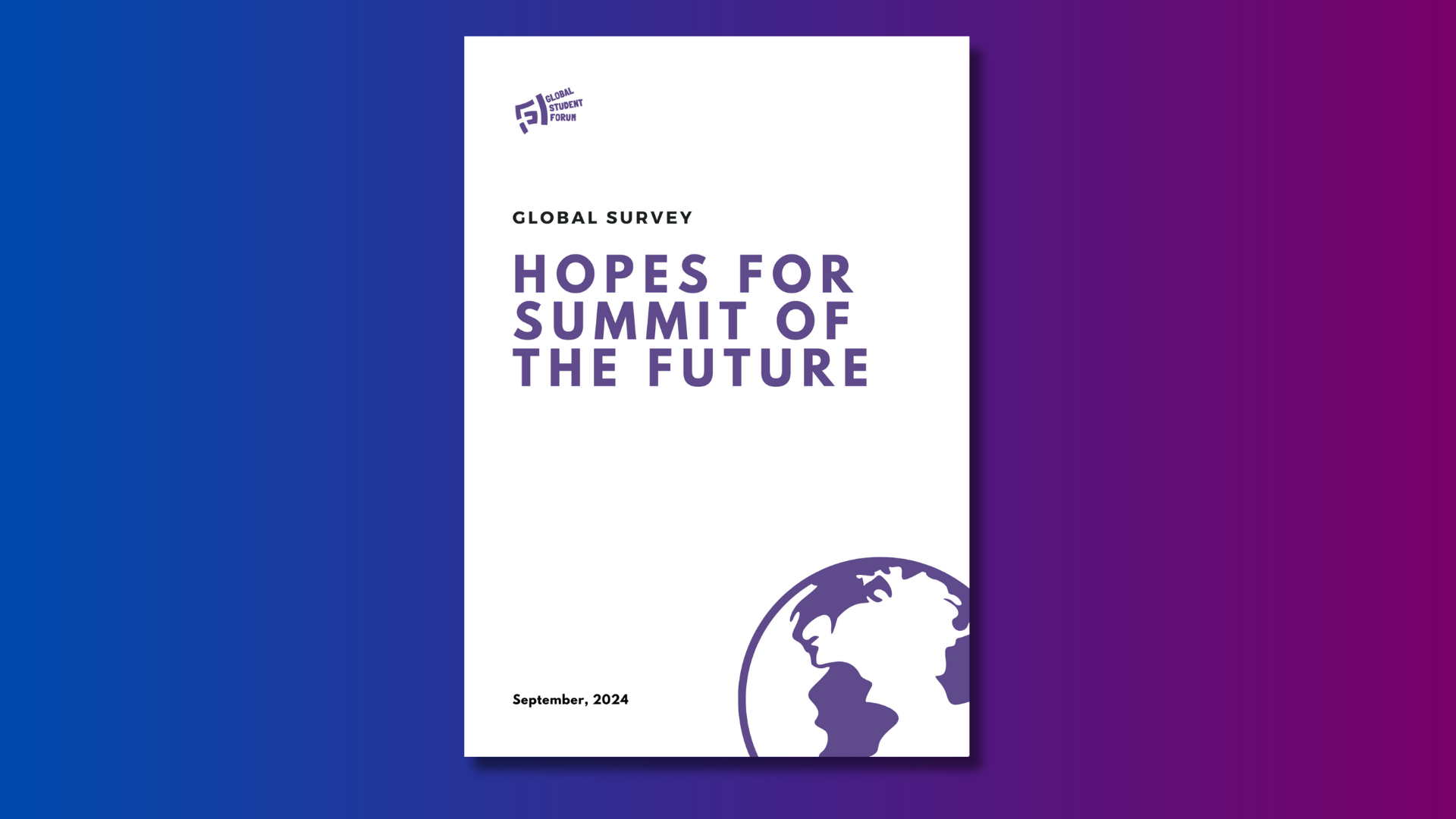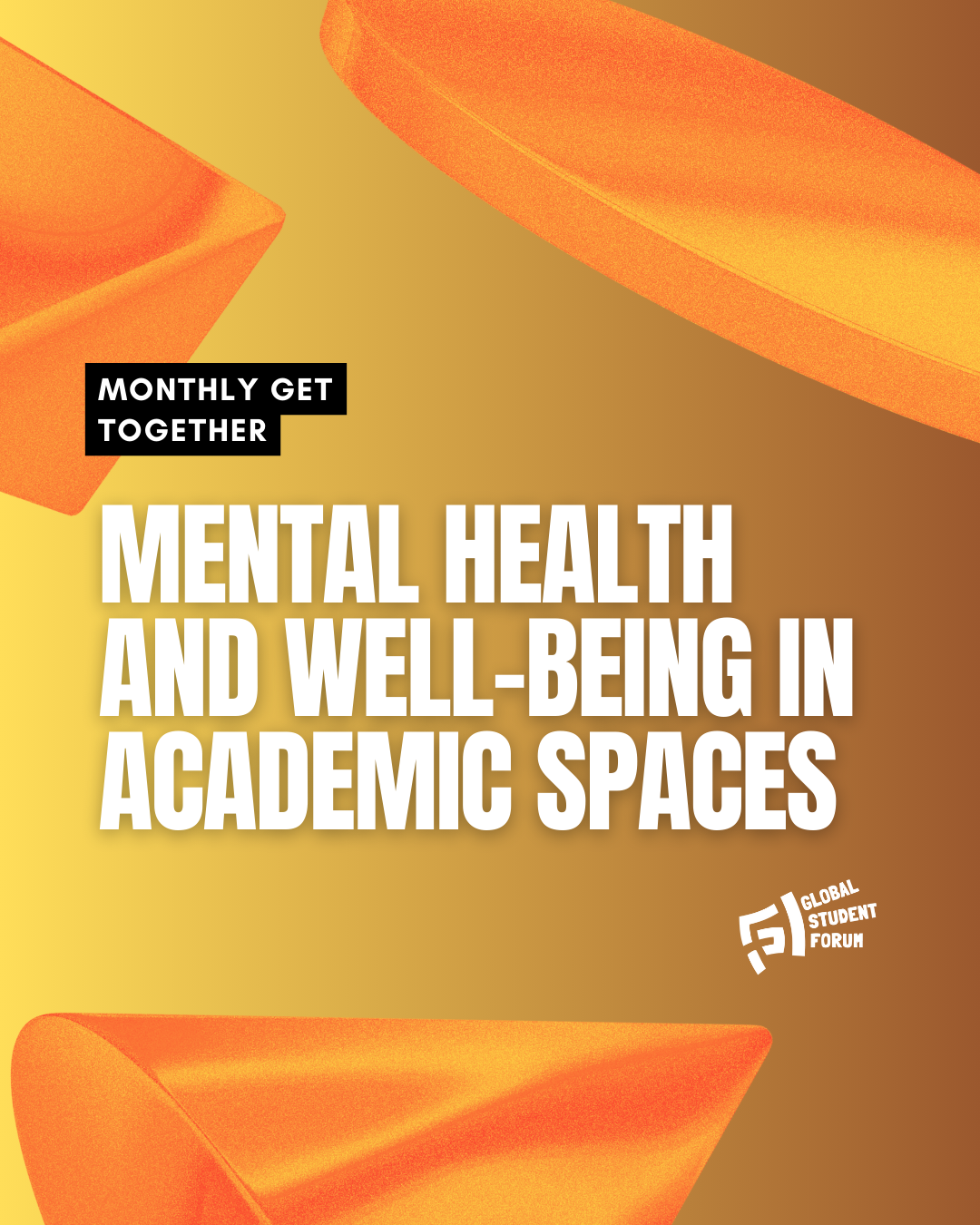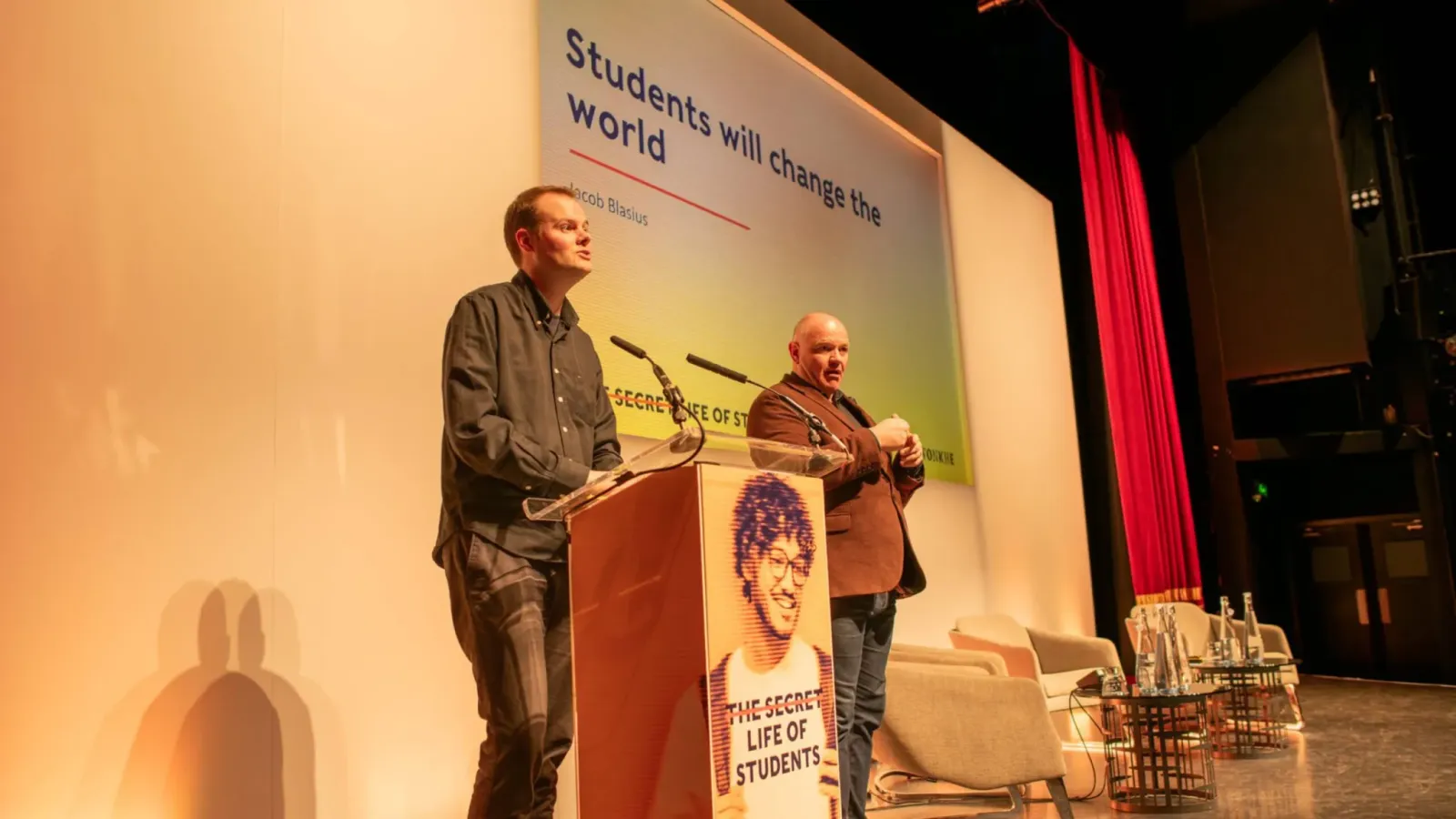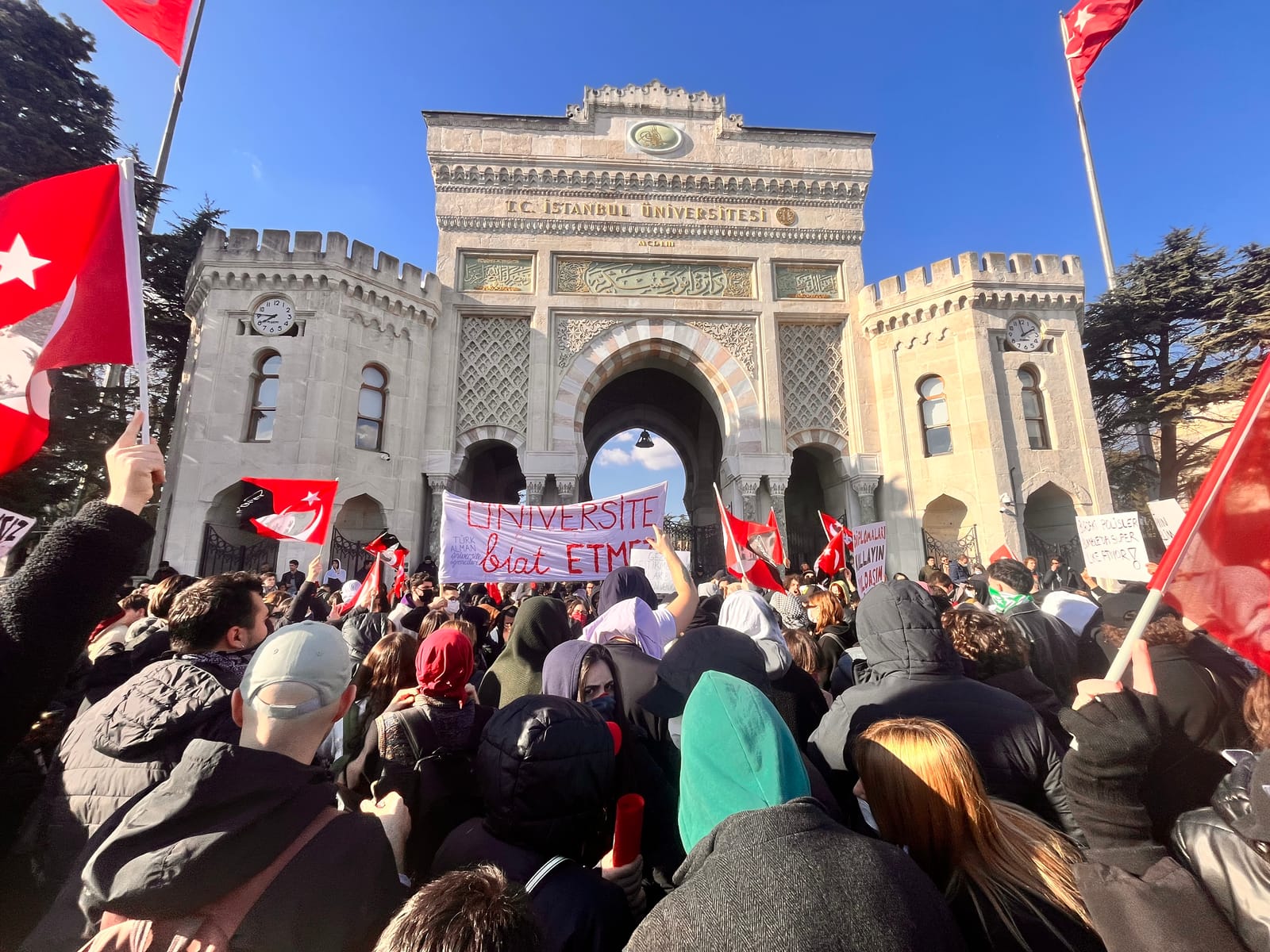Executive Summary
This report presents key insights from a survey of students and young leaders regarding their expectations for the upcoming Summit of the Future. The survey highlights participants' priorities, focusing on education, climate action, international cooperation, peace, and security as the critical areas they hope the summit will address.
Key Outcomes Identified:
- Advancing Education: Respondents emphasized the need to enhance global education systems, viewing education as vital for addressing poverty, inequality, and climate change. There was a call for integrating technology and critical thinking into curricula, making education relevant to today’s challenges. Special emphasis was placed on ensuring equitable access, particularly for marginalized communities, and creating culturally responsive and locally relevant educational models.
- Climate Action: The urgency of the climate crisis was a dominant theme, with participants calling for concrete and ambitious actions beyond rhetoric. Priorities include reducing carbon emissions, transitioning to renewable energy, and building sustainable infrastructure. Many stressed the need for climate justice, supporting vulnerable populations, and ensuring a fair transition to greener economies.
- Stronger International Cooperation: Participants advocated for enhanced global collaboration to address interconnected challenges like climate change, health crises, and inequality. They emphasized the importance of empowering global institutions to take decisive action and fostering equitable solutions, particularly in helping developing nations through aid and technology transfer.
- Peace and Security: Respondents called for stronger global efforts in promoting peace and addressing security threats. They advocated for preventive diplomacy, peacebuilding initiatives, and protecting vulnerable populations, such as refugees and those affected by conflicts. Emerging security threats, including cyber warfare and terrorism, were also key concerns.
Involvement in the Summit:
An overwhelming majority (83.3%) of respondents expressed a strong desire to actively participate in discussions and forums at the summit, while 70% wished to contribute tangible ideas and solutions. This reflects the growing demand for youth inclusion in global decision-making processes, with participants eager to offer fresh perspectives and innovative approaches to addressing global challenges.
This report analyses results from a survey conducted among students and young leaders regarding their hopes and expectations for the upcoming Summit of the Future. The findings focus on the key outcomes participants hope to see from the summit, and how they wish to be involved.
The survey participants were asked to select up to three outcomes they hope the Summit of the Future will address. The results reveal that students are most concerned with advancements in education, climate action, international cooperation, and peace and security. The following outcomes were highlighted:
Advancing Education
Respondents highlighted the importance of enhancing education systems worldwide. This demonstrates a growing consensus that education is not just a foundational human right, but also a transformative tool for fostering sustainable development and social equity. Many participants viewed education as the key to empowering individuals and communities to tackle pressing global issues such as poverty, inequality, and climate change.
In the context of today's rapidly evolving world, respondents stressed that education must adapt to remain relevant. Traditional models are no longer sufficient; instead, educational systems need to integrate new technologies, promote critical thinking, and equip learners with skills suited to addressing contemporary challenges. There was a particular emphasis on ensuring that education is not just theoretically sound but practically applicable, enabling young people to contribute effectively to society. A recurring theme was the necessity of targeting marginalised and disadvantaged populations, including those in rural areas, conflict zones, and economically impoverished communities. Respondents advocated for initiatives that address systemic barriers to education, such as inadequate infrastructure, lack of resources, and discriminatory practices. They highlighted the need for policies that ensure equitable access, such as providing scholarships, improving digital infrastructure for remote learning, and fostering inclusive environments where all students, regardless of their background, can thrive.
The call for culturally responsive and locally relevant curricula was also a prominent point. Participants argued that education must not only equip students with global competencies but also resonate with their local realities and aspirations. This dual approach, they believed, would help cultivate more engaged and empowered citizens capable of driving both local and global progress.
Concrete Actions on Climate Change
Respondents expressed their expectation that the summit prioritizes and implements meaningful, tangible measures to address the growing climate crisis. This reflects a widespread sense of urgency among young people, who recognize the profound and long-lasting impact that climate change will have on their futures. For many, the climate crisis is not an abstract issue but a lived reality that threatens ecosystems, livelihoods, and the stability of their communities.
Respondents stressed that it is no longer sufficient for global leaders to merely acknowledge the problem. Instead, they called for actionable and ambitious solutions that go beyond rhetoric. Among the key areas for action were the reduction of carbon emissions, promotion of renewable energy sources, and the development of sustainable infrastructure. Participants urged leaders to make firm commitments to international agreements such as the Paris Climate Accord, while ensuring that these commitments are backed by concrete implementation strategies and accountability mechanisms.
A significant portion of the youth surveyed expressed frustration with the slow pace of current climate initiatives, citing the widening gap between the promises made in global forums and the actual policies enacted at national and local levels. Many advocated for policies that go beyond incremental changes, calling for bold, systemic shifts in the way economies operate. There was a particular emphasis on transitioning away from fossil fuels and investing in green technology, with respondents arguing that these measures are not just environmentally necessary but also economically beneficial, offering opportunities for job creation and sustainable growth.
Another critical theme was the disproportionate impact of climate change on vulnerable populations, particularly in low-income countries and small island nations. Respondents highlighted the need for climate justice, urging leaders to support those most affected by environmental degradation and ensure that the transition to a greener economy is fair and inclusive. This includes financing adaptation strategies for countries that are already experiencing the worst effects of climate change, such as rising sea levels, extreme weather events, and agricultural disruptions. Young people also underscored the importance of grassroots activism in driving climate action. They argued that top-down approaches must be complemented by bottom-up initiatives that engage civil society, particularly youth and student movements, in decision-making processes. This includes amplifying the voices of indigenous communities and other groups who have been historically sidelined in climate discussions.
Stronger International Cooperation
The theme of Stronger International Cooperation resonated with participants, who expressed a clear and urgent desire for greater collaboration among nations. Respondents remarked that many of today’s most pressing global challenges—ranging from inequality and health crises to environmental degradation and conflicts—cannot be effectively addressed by individual countries acting alone. Instead, they emphasized that these complex, interconnected issues demand a collective and coordinated response from the global community.
Participants underscored that the rise in global challenges, such as the COVID-19 pandemic, climate change, and widening socio-economic inequalities, has made the case for international cooperation more compelling than ever. For many young people, the pandemic served as a stark reminder of how interconnected the world is, illustrating that crises in one region can quickly spread and affect others. This has strengthened their belief in multilateralism, with many arguing that global institutions, such as the United Nations and World Health Organization, must be empowered to take more decisive action in crisis management and sustainable development efforts.
In addition, respondents called for international frameworks that promote fairer economic systems and equitable distribution of resources, particularly in addressing the disparities between developed and developing nations. There was a strong emphasis on the need for wealthier nations to take responsibility in helping less economically developed countries through aid, technology transfers, and capacity-building efforts. Participants stressed that global solutions should be rooted in equity, ensuring that no country or population is left behind in addressing issues like poverty, access to healthcare, and climate adaptation.
Climate change was frequently cited as a prime example of an issue that requires global solidarity. Respondents noted that while individual nations can make progress on reducing carbon emissions or protecting natural resources, the global nature of the crisis means that these efforts must be coordinated on an international scale to have a meaningful impact. There was widespread support for stronger international agreements and partnerships focused on environmental protection, with participants calling for more ambitious and binding targets to ensure accountability.
Furthermore, many young people highlighted the importance of cultural exchange and diplomacy as tools for fostering cooperation and mutual understanding. They expressed a desire for greater engagement in cross-border dialogue, student exchange programs, and international collaborations that promote peacebuilding and address shared global concerns. This reflects their broader vision of a world where nations work together not just to address crises but to build a more inclusive, peaceful, and interconnected global society.
Enhanced Measures for Peace and Security
Respondents called for stronger efforts in promoting peace and addressing security challenges on a global scale. With ongoing conflicts, rising tensions, and persistent threats to safety in various regions, participants expressed a clear expectation that the summit should prioritize sustainable peace initiatives and policies aimed at safeguarding vulnerable populations.
Respondents emphasized that peace and security are fundamental prerequisites for development, prosperity, and the protection of human rights. They highlighted the devastating impact of conflicts, not only in terms of loss of life and displacement but also in the way they hinder progress on issues such as poverty reduction, education, and health. For many participants, ensuring peace is a multi-dimensional challenge that requires addressing root causes, such as economic inequality, political instability, and social injustice, as well as responding to immediate threats.
There was a strong call for the international community to take a more proactive role in conflict prevention and resolution. Many young people expressed frustration with the reactive nature of global responses to crises, advocating instead for preventive diplomacy and early intervention strategies to avoid escalation. They underscored the importance of dialogue, mediation, and peacebuilding initiatives that engage all stakeholders, including marginalized groups such as women, youth, and indigenous populations, who are often disproportionately affected by conflict but sidelined in peace processes.
The protection of vulnerable populations—particularly refugees, internally displaced persons, and communities affected by violence—was a recurring theme. Respondents urged global leaders to strengthen international frameworks for humanitarian assistance and protection, ensuring that those fleeing conflict or living in insecure environments receive the support they need. This included calls for enhanced refugee protections, safe migration pathways, and greater accountability for human rights violations committed in conflict zones.
Participants also stressed the need to address newer, emerging security threats, such as cyber warfare, terrorism, and the proliferation of weapons. They recognized that security challenges are evolving and becoming more complex, requiring international cooperation and updated policies that reflect the current global landscape. In particular, there was concern over the impact of cyber-attacks on critical infrastructure, disinformation campaigns, and the rise of extremist ideologies, all of which have the potential to destabilize societies and undermine peace efforts.
Another key aspect was the role of education in promoting peace. Respondents highlighted the need for peace education programs that foster understanding, tolerance, and conflict resolution skills among students. They argued that promoting a culture of peace starts with empowering the next generation with the tools to engage in peaceful dialogue, resist violence, and build bridges across divides.
Involvement
The majority of participants expressed a clear eagerness to directly engage in the summit’s deliberations and activities, demonstrating a growing sense of empowerment and commitment to contributing meaningfully to global issues.
Participating in Discussions
83.3% of respondents expressed interest in actively participating in the summit through discussions and forums. This overwhelming response illustrates the increasing demand for youth to be included in global decision-making processes. Young people today are more informed, connected, and engaged than ever before, and they are no longer content with simply being spectators in international forums. Instead, they are seeking a seat at the table, where they can lend their perspectives, challenge the status quo, and contribute to shaping policies that will affect their futures.
Many respondents emphasized that their generation is uniquely positioned to contribute fresh perspectives and innovative ideas, particularly on issues that directly impact them, such as climate change, education, and global inequality. They highlighted the importance of intergenerational dialogue, arguing that the wisdom and experience of older leaders should be complemented by the energy, creativity, and forward-thinking mindset of younger generations. The strong interest in participating in discussions also reflects a broader recognition of the need for more inclusive and participatory governance models at the global level.
Contributing Ideas and Solutions
In addition to participating in discussions, 70% of participants indicated that they want to contribute tangible ideas and solutions to the challenges being addressed at the summit. This response underscores the fact that young people do not see themselves as mere observers or critics but as active problem-solvers who are eager to collaborate in finding creative and innovative solutions for the world’s most pressing issues.
Respondents highlighted that they often bring a fresh perspective to problem-solving, fueled by their firsthand experiences of living in an increasingly interconnected and rapidly changing world. They pointed out that their generation is adept at leveraging technology, social networks, and digital platforms to drive change, and they want to use these skills to propose actionable solutions in areas like climate action, education reform, and sustainable development. Many also emphasized the importance of integrating youth-led initiatives into broader policy frameworks, ensuring that young people’s contributions are taken seriously and that their ideas can have a real impact on global decision-making processes.
This desire to be involved in solution-building reflects a shift in how young people view their role in global governance. They see themselves not just as beneficiaries of policy but as equal partners in the process of creating it. Many expressed a strong belief that the future cannot be built without the active participation and leadership of youth, particularly on issues that will affect their generation most acutely.
Methodology
These survey findings were made possible by an online data collection process targeting students and young leaders through the communication channels of the Global Student Forum in the period July to September 2024. The survey aimed to capture both quantitative and qualitative insights into the priorities and expectations young people and students have for the upcoming summit. To achieve this, the survey included a combination of multiple-choice questions and open-ended responses. The quantitative data derived from the multiple-choice questions were analyzed using descriptive statistics, providing a clear picture of trends and preferences across the participant pool. This approach allowed for a straightforward interpretation of the key outcomes hoped for from the summit and the preferred ways in which participants wished to be involved.
For the qualitative data, which came from open-ended responses, a thematic analysis was conducted. This method enabled the identification of common themes, concerns, and ideas that emerged from the diverse perspectives shared by the respondents. Through this approach, the analysis captured deeper insights into the motivations and thought processes behind the quantitative data, providing a richer understanding of the issues that young people believe are crucial for the summit to address.
While the survey was distributed widely, with respondents coming from, among others, Lithuania, Solomon Islands, Uganda, Uzbekistan, the United States, New Zealand and Sierra Leone, certain limitations must be acknowledged. The sample, though diverse in terms of participants, may be subject to self-selection bias, as individuals who are particularly engaged or interested in global governance and UN Summits may have been more inclined to participate. Additionally, the geographic representation was limited by lower number of respondes in Latin America. Despite these limitations, the survey results offer valuable insights into the hopes and expectations of young leaders worldwide and provide a foundation for understanding youth and student perspectives on global issues and their desired role in shaping the future.








